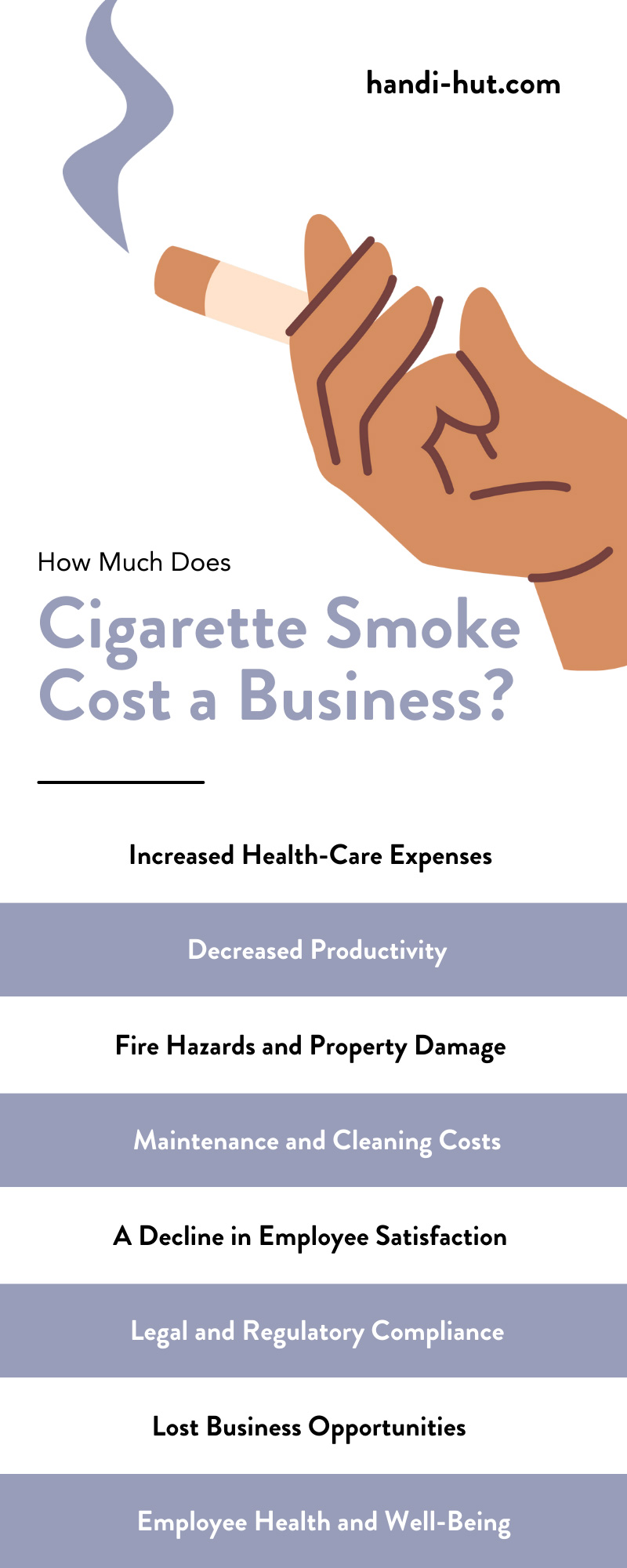
Cigarette smoking has been a major health hazard for a very long time due to its toxic properties. The negative effects of smoking extend beyond personal health concerns; it can cause permanent damage to both smokers and those who breathe smoke in.
Businesses suffer significant problems regarding the costs associated with cigarette smoke, such as increased health-care expenses and decreased productivity. A safe environment is essential for businesses to thrive and attract people who want to have a pleasant experience inside a safe space.
This information on how much cigarette smoke costs a business will highlight some of the hidden costs that smoking imposes on different establishments. Creating a smoke-free environment and promoting healthier practices will bring positive benefits for everyone to enjoy.
Increased Health-Care Expenses
The most noticeable cost that businesses face from cigarette smoke is the escalation in health-care expenses. Employees who smoke are more prone to a range of health problems, including respiratory diseases, cardiovascular issues, and various cancerous developments.
Companies must assume the financial liability of increased health insurance premiums, higher absenteeism rates, and elevated health-care claims. The annual health-care costs for a smoker can exceed those of a non-smoker, which increases health-care expenses.
Decreased Productivity
Cigarette smoke also impacts workplace productivity. Smokers often take regular breaks to satisfy their nicotine cravings, disrupting the workflow and reducing overall efficiency inside a business’ operational schedule.
Smokers spend an average of six to 10 minutes on each smoking break, resulting in substantial time losses over the course of a working day. The negative effects of secondhand smoke on non-smoking employees also aggravate the issue, leading to increased absenteeism and decreased job performance.
For a business to thrive and survive in a competitive market, productivity must be at optimal levels; otherwise, a business won’t stand apart.
Fire Hazards and Property Damage
Smoking-related fires pose a significant threat to business establishments, which could have catastrophic consequences and damage the establishment’s reputation. When smokers discard cigarette butts improperly, they can easily ignite flammable materials. This could lead to devastating fires.
Insurance percentages might rise in response to these risks, straining the financial resources of businesses and limiting their expansion. By enforcing smoke-free policies and providing designated smoking areas with an outdoor smoking shelter away from flammable materials, companies can minimize the potential damage caused by smoking-related fires.
Maintenance and Cleaning Costs
The presence of cigarette smoke in the workplace contributes to higher maintenance and cleaning expenses. This is because it often takes longer to remove smoke damage. Plus, smoking leaves behind a strong odor that attaches to fabrics, carpets, and furniture. Businesses may have to clean or replace items soiled by smoke.
When smoke particles settle on surfaces, they often cause discoloration and staining, which may require more frequent deep cleaning or repainting. These costs can hurt businesses, as business owners must spend resources that they could have used in other critical areas to enhance and improve the establishment.
A Decline in Employee Satisfaction
In businesses that allow smoking, non-smoking employees often feel neglected and resentful due to exposure to secondhand smoke. This can create an unhealthy work environment and result in a decline in employee morale and job satisfaction, which isn’t good for business.
The dissatisfaction among non-smoking employees may lead to increased turnover rates. This impacts the business’s productivity, stability, and development. Implementing smoke-free policies promotes a healthier and more inclusive work environment and enhances overall employee and client satisfaction.
Employees having to work in a smoke-contaminated environment can also cause a lack of motivation. A business’s staff is the most important component for efficiency and reliable results, which is why a business must be conscious of its practices.
Legal and Regulatory Compliance
Cigarette smoke can cost businesses a lot, especially with the legal implications of allowing unauthorized smoking on their premises. Laws and regulations regarding smoking in public places vary from region to region, and different locations have strict measures to protect and enhance public health.
Failure to comply with these guidelines can result in heavy fines, legal penalties, and damage to a company’s reputation for years to come. By adopting smoke-free policies in advance, businesses can proactively align with these requirements and avoid costly legal consequences.
Lost Business Opportunities
In today’s health-conscious society, many potential clients and business partners prioritize engaging with companies that promote wellness and a smoke-free environment. Businesses that allow smoking may discourage potential partnerships, client relationships, and new positive opportunities.
By actively promoting a smoke-free workplace, businesses can attract health-conscious clients, improve their reputation, and enhance their brand image, potentially unlocking new avenues for growth. A smoke-free environment promotes a healthier lifestyle and creates a consciousness of respect for others by minimizing direct exposure to secondhand smoke.
Businesses like casinos and bars have certain policies that allow smokers to exercise their right to smoke. However, these establishments target a specific clientele that is OK with direct exposure to smoke and don’t mind the consequences.
Employee Health and Well-Being
Businesses have a wide interest in the health and well-being of their employees because it benefits the staff and the business. Smoking hinders their ability to perform optimally, resulting in negative results and poor efficiency.
By investing in programs to stop smoking, providing resources for tobacco dependency treatment, and creating a supportive environment, businesses can actively contribute to their employee’s well-being. This investment can bring long-term benefits like reduced healthcare costs, increased productivity, and a more engaged and motivated workforce.
The costs associated with cigarette smoke are far-reaching and extend beyond personal health concerns; they could also affect a group as a whole. By understanding the multiple impacts of smoking on businesses, you’ll see the urgent need for comprehensive smoke-free policies and initiatives.
Investing in employee well-being, adhering to legal regulations, and promoting a healthier work environment can pave the way for a more productive, safe, and sustainable business future. Embracing smoke-free practices benefits individual employees and contributes to the overall success and longevity of businesses in an increasingly health-conscious world, so start implementing changes today.

